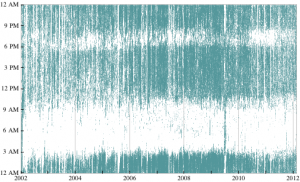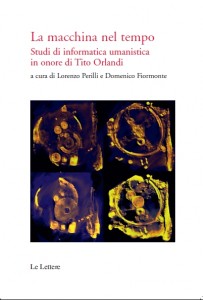Reading the Washington Post I was annoyed by a panel at the bottom of my screen with their @MentionMachine tracks the presidential candidates: Who’s up, who’s down on Twitter?. The @MentionMachine tracks Twitter mentions using the Twitter API and also media mentions using Trove. This is real-time social media text analysis. The Washington Post blog page on @MentionMachine argues that “Twitter was the real-time warning system” that could tell us which candidates were trending up or down. I wonder if that is reliably true or only true in selective cases.
Narrative and Technology: Curtis Wong and Geoffrey Rockwell in Conversation – YouTube
The kind folks at the Long Room Hub at Trinity College Dublin have put up the video of the “conversation” I participated in on the 6th of March. The event was called Narrative and Technology: Curtis Wong and Geoffrey Rockwell in Conversation. Curtin Wong is now at Microsoft Research, but worked for some time at the Voyager Company back in the days when they were developing some of the most interesting multimedia works.
IBM Sage Computer, 1960 from the Retronaut
Thanks to the Guardian I discovered the Retronaut, a site dedicated to past visions including past visions of the future. They have a number of interesting things like a video of the IBM Sage Computer, 1960 or Video Games Then and Now. There is a prescient Telecommunications Services for the 1990s created in 1969 for the Post Office Research Station of the UK in 1969.
Stephen Wolfram Blog : The Personal Analytics of My Life
 Thanks to Bethany on twitter I came across this great post by Stephen Wolfram on The Personal Analytics of My Life. Wolfram is not the first person to use computers to track his activities and then understand himself. Microsoft Research has a project MyLifeBits that is “an attempt to fulfill Vannevar Bush‘s vision of an automated store of the documents, pictures (including those taken automatically), and sounds an individual has experienced in his lifetime, to be accessed with speed and ease.” The project is digitizing and following Gordon Bell and they have released a book Your Life, Uploaded. We could even go back to the ancient Greek aphorism “Know theyself” that motivated Socrates and which, in its Latin form (temet nosce), shows up over the door of the Oracle in the Matrix.
Thanks to Bethany on twitter I came across this great post by Stephen Wolfram on The Personal Analytics of My Life. Wolfram is not the first person to use computers to track his activities and then understand himself. Microsoft Research has a project MyLifeBits that is “an attempt to fulfill Vannevar Bush‘s vision of an automated store of the documents, pictures (including those taken automatically), and sounds an individual has experienced in his lifetime, to be accessed with speed and ease.” The project is digitizing and following Gordon Bell and they have released a book Your Life, Uploaded. We could even go back to the ancient Greek aphorism “Know theyself” that motivated Socrates and which, in its Latin form (temet nosce), shows up over the door of the Oracle in the Matrix.
Continue reading Stephen Wolfram Blog : The Personal Analytics of My Life
Interview with doujinshi creator
While I was in Japan I had the good fortune to meet a number of people who were involved in the creation of fan circle or doujin manga, anime and games. These circles and the often very professional fan works they publish are a phenomenon that is important to understanding Japanese popular culture so I asked one if I could interview her about her experience. The interview was conducted over email in December of 2011, January and Februrary of 2012. I sent her questions, she sent back answers, and I edited them into this dialogue which she then checked and added to. In my editing I tried to keep her distinctive voice, but did edit for grammar where confident in her meaning. In some cases I have added explanations that are [in brackets and italicized.] I have kept her identity secret at her request.
HUMlab Space – a set on Flickr
The HUMlab at Umeå University is one of the best designed computing labs I have seen. The director Patrik Svensson has created a multi-purpose space out of a library basement. When there in February I took some photos to document the space – see a Flickr set on the HUMlab Space.
Computer labs used to rows of desktop computers all facing a shared projection space. Now that most students have laptops we don’t need those sorts of labs. The HUMlab instead features all sorts of shared spaces with different screens and projectors. The idea is that a lab should support different arrangements of people around shared social screens. You have private spaces, couches, small seminar tables, exhibit screens, and larger presentation spaces.
Umea: Flux Shop
Last week I was in Umea, Sweden at the HumLab run by Patrik Svensson. I gave a paper on “Making theoretical things in the digital humanities.” While wandering around Umea I came across an amusing conceptual art shop – Flux Shop – Erase the boundary between art and life. The shop is a front for an ad firm, but you can buy conceptual art and I ordered a work.
Voyant at Georgia Tech
Today I Skyped into a class by Lauren Klein on Digital Humanities at Georgia Tech. The students all had to use Voyant for an assignment and they had a great set of questions to ask me. See Questions for Professor Rockwell.
Klein also had her students post short essays on using Voyant on Sherlock Holmes under the category Sherlock Holmes Text Analysis. You can see the range of reactions from frustration with the tool, to “so what”, to students who find the “surfing and stumbling” creative. I’m impressed at how Professor Klein has put together a reasonable exercise in text analysis for undergrads.
In the spirit of Voyant, here is a word cloud of the student assignments on the course blog:
The machine in time: In honour of Tito Orlandi
Domenico pointed me to an entry on InfoLet (a blog he and others keep in Italian on informatics and literature.) The entry announces a book La macchina nel tempo: Studi di informatica umanistica in onore did Tito Orlandi that brings together many of the top digital humanists in Italy to celebrate Tito Orlandi’s contribution to the field. You can order online at http://www.lelettere.it. Continue reading The machine in time: In honour of Tito Orlandi
The Digital Humanities and the Revenge of Authority
That has always been my aim, and the content of that aim — a desire for pre-eminence, authority and disciplinary power — is what blogs and the digital humanities stand against.
Stanley Fish in his blog post on The Digital Humanities and the Transcending of Mortality starts by setting himself up as an example of what the digital humanities stands against. We know that his tongue is in his cheek because he prefaces this aim for authority by mentioning David Lodge’s character Morris Zapp “whose ambition, as his last name suggests, is to write about a topic with such force and completeness that no other critic will be able to say a word about it.” It is a lovely move that he returns to at the very end when he reminds us that we are reading a “column, oops, I mean blog.” He can disarm his critics by mocking the authority he really has while using it. That authority comes from, among other things, writing a column/blog in the New York Times. Fish is a slippery Zapp, and he knows it.
Continue reading The Digital Humanities and the Revenge of Authority


